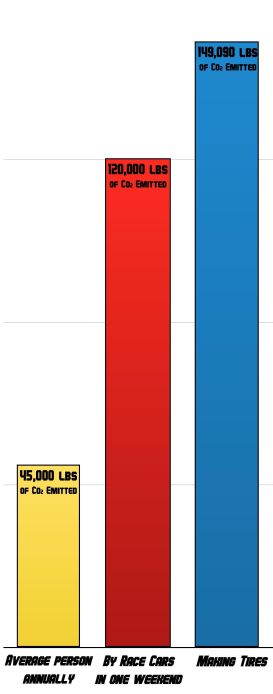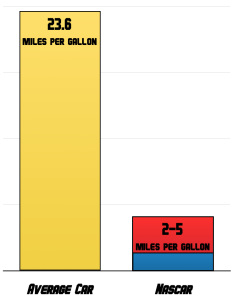When people think of NASCAR, many people imagine cars flying at speeds of 180 miles per hour. Spectators of the sport often do not think about how the cars could be hurting the environment.

There has been an ongoing debate if NASCAR is truly bad for the environment.
In one racing weekend, the race cars release 120 thousand pounds of carbon dioxide, or CO2, into the atmosphere. To put that stat into perspective, a person will contribute 45 thousand pounds of CO2 on a yearly basis.
An average race team uses about eight-to-10 sets of tires in a weekend, and it takes about seven gallons of oil to make one tire.
The process of burning the oil to create these tires adds massive amounts of CO2 into the air. It puts about 698 pounds of CO2 in the air for one barrel of oil.
This all adds up to about 149,090 pounds of CO2 just from the oil being consumed in one weekend. Tire companies recycle tires to cut the process of oil being burned, so CO2 does not get released into the atmosphere.
Up until the year of 2017, NASCAR racing cars have been running on leaded gas. Leaded gas releases toxic lead into the atmosphere, this type of gas has not been in people’s cars since the 80s.
NASCAR has also gotten involved with helping out the environment as a whole sport. The organization, NASCAR Green, is a huge proponent to help minimizing the effect NASCAR has on the environment.
Each weekend, from February until November, NASCAR races to a green flag rather than a checkered one at tracks all across America. NASCAR is one of the most watched sport in the world, as millions of people tune in every weekend to check out the race.
For 38 weekends of the year, millions of people tailgate races all over the country for their passion for racing. So NASCAR spreading awareness of conserving the environment is seen by millions even if it is as simple as changing the checkered flag to the color green.
There are different raceways around the country that help the environment out, as well as different motor companies.
Pocono raceway is operated 100 percent by solar panels, while planting trees across the country. Martinsville Speedway has put in LED lights around the race track for more efficient lighting. There have been many other raceways that have also been a part of this movement in the racing world.
Chris Fonte, a Cabrini University senior, is a very avid NASCAR fan. Fonte discussed a variety of points about how NASCAR does not necessarily impact the environment negatively, but believes the bigger environmental issue takes place in the parking lots.

“If you ever go to a race, you will see thousands of cars in one parking lot,” Fonte said. “The issue is mainly with the trash of those thousands of people leaving behind cans and bottles in the lot. Also, you are allowed to bring a cooler into races so there’s another spot where just pollution and garbage is just thrown to the point that a caution flag actually has to come out because of a bag of chips flying on the track.”
NASCAR going green has evolved how the sport has been traditionally done in the past 10 to 15 years. NASCAR Green also has recycling bins all over the raceways in an effort to encourage spectators to recycle. Racing teams have also joined in the movement to help NASCAR become more environmentally friendly.
Roush Fenway racing recycles 96 percent of their cars from the racetrack in an effort to reuse their cars to help the environment. The environment has been a very big issue for NASCAR in the recent years.
A point of emphasis for NASCAR due to all the pollution the sport does for the Earth. NASCAR has many different tactics for their going green movement.
“Coca-Cola has tents set up outside and even will give you a free item if you recycle your cans at their recycling bins,” Fonte said.


